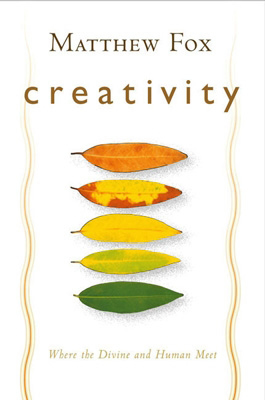Recently, I led a weekend-long workshop on the themes of Matthew Fox’s book The Reinvention of Work. Among the high moments of the event, I can surely count the deep impression that the participants felt with regard to some poetry quoted in the book.
This poem by Rumi stunned them:
I have said before that every craftsman searches for what’s not there to practice his craft.
A builder looks for the rotten hole where the roof caved in. A water-carrier picks the empty pot. A carpenter stops at the house with no door.
Workers run toward some hint of emptiness, which they then start to fill. Their hope, though, is for emptiness, so don’t think you must avoid it. It contains what you need!
The notion that the engine of our activity is found in the lack thereof, or that — as the Tao Te Ching puts it — being originates from non-being, not only is not familiar to most of us, but is paradoxical and hard to understand.
But the participants to the workshop, having gone through two days of revision of their (working) life, understood intuitively that Rumi says something enormously important. Although each of them applied the poem to themselves individually in ways that cannot be repeated, the consensus was that when we complain about our activities, because we find that something is missing — be it success, or recognition, or retribution, or satisfaction — it is precisely by working on that lack that something begins to change for the better.

The point — we agreed —is neither simply to acknowledge the lack, nor to rush to fill it mindlessly, that is, without craft. The point is daring to look into the empty spot, entertaining the void without being carried out by it.
Our life is made of our actions in the world, there is no doubt about it. Apathy (acedia) is a grave sin in the Christian tradition. In the Gospel of John, Jesus is depicted as working until his life ends: My Father is always at work, and so am I (Jn 5:17); I ought to work the works of the One who sent me while it is day (Jn 9:4).
But true actions — the kind of actions that are not simply reactions to the environment but are really free and spontaneous — come from the quiet of non-action, from emptiness recognized and entertained. And — if we follow the mystical hints of the Gospel of John — these are not just human actions, they are also divine. They are the works of the One/Father through Jesus/people.
(Interestingly, there are two main versions in the earlier manuscripts of John 9:4, one with “I ought” and the other with “we ought,” indicating that early Christians understood that Jesus’ task and our task are one and the same).
Rumi’s poem continues and ends in this way:
Dear soul, if you were not friends with the vast nothing inside, why would you always be casting your net into it, and waiting so patiently?

This invisible ocean has given you such abundance, but still you call “death,” that which provides you sustenance and work.
I am afraid I cannot be more clear or specific on this topic of the void as the origin of action and life, as it stretches language to its limits, to the confines of what can be said.
Matthew’s comment on this poem — besides emphasizing the relationship between worker and nothingness — picks up on death and moves our perspective from that of the individual worker to the work of the universe:
Emptiness and nothingness are part of the Great Work of the universe and, indeed, feed our yearning for work. The universe absorbs all deaths and recycles it, weather the death of stars or supernovas, of spouses or friends. Death is a return to our origins, and it marks the end of our work. But death also brings about a melting of our work into the Great Work of the universe and into the work and the work lives of all our ancestors.
Quotes from Matthew Fox, The Reinvention of Work: A New Vision of Livelihood For Our Time p. 55.
See also Fox, Creativity: Where the Divine and Human Meet.
Also see Fox, Original Blessing: A Primer in Creation Spirituality
Also see Fox, Creation Spirituality: Liberating Gifts for the Peoples of the Earth.
And Fox, One River, Many Wells: Wisdom Springing from Global Faiths
And Fox, Passion for Creation: The Earth-Honoring Spirituality of Meister Eckhart
Banner Image: Vintage wagon wheel. Photo by Thomas Merton, from the Thomas Merton Center, reprinted in A Way to God: Thomas Merton’s Creation Spirituality Journey by Matthew Fox.
Queries for Contemplation
What resonates in you from the poem by Rumi?
Recommended Reading

The Reinvention of Work: A New Vision of Livelihood For Our Time
Thomas Aquinas said, “To live well is to work well,” and in this bold call for the revitalization of daily work, Fox shares his vision of a world where our personal and professional lives are celebrated in harmony–a world where the self is not sacrificed for a job but is sanctified by authentic “soul work.”
“Fox approaches the level of poetry in describing the reciprocity that must be present between one’s inner and outer work…[A]n important road map to social change.” ~~ National Catholic Reporter

Creativity: Where the Divine and Human Meet
Because creativity is the key to both our genius and beauty as a species but also to our capacity for evil, we need to teach creativity and to teach ways of steering this God-like power in directions that promote love of life (biophilia) and not love of death (necrophilia). Pushing well beyond the bounds of conventional Christian doctrine, Fox’s focus on creativity attempts nothing less than to shape a new ethic.
“Matt Fox is a pilgrim who seeks a path into the church of tomorrow. Countless numbers will be happy to follow his lead.” –Bishop John Shelby Spong, author, Rescuing the Bible from Fundamentalism, Living in Sin
Original Blessing: A Primer in Creation Spirituality
Matthew Fox lays out a whole new direction for Christianity—a direction that is in fact very ancient and very grounded in Jewish thinking (the fact that Jesus was a Jew is often neglected by Christian theology): the Four Paths of Creation Spirituality, the Vias Positiva, Negativa, Creativa and Transformativa in an extended and deeply developed way.
“Original Blessing makes available to the Christian world and to the human community a radical cure for all dark and derogatory views of the natural world wherever these may have originated.” –Thomas Berry, author, The Dream of the Earth; The Great Work; co-author, The Universe Story

Creation Spirituality: Liberating Gifts for the Peoples of the Earth
Fox’s spirituality weds the healing and liberation found in North American Creation Spirituality and in South American Liberation Theology. Creation Spirituality challenges readers of every religious and political persuasion to unite in a new vision through which we learn to honor the earth and the people who inhabit it as the gift of a good and just Creator.
“A watershed theological work that offers a common ground for religious seekers and activists of all stripes.” — Frederic and Mary Ann Brussat, Spirituality and Practice.
“I am reading Liberating Gifts for the People of the Earth by Matt Fox. He is one that fills my heart and mind for new life in spite of so much that is violent in our world.” ~ Sister Dorothy Stang.

One River, Many Wells: Wisdom Springing from Global Faiths
Matthew Fox calls on all the world traditions for their wisdom and their inspiration in a work that is far more than a list of theological position papers but a new way to pray—to meditate in a global spiritual context on the wisdom all our traditions share. Fox chooses 18 themes that are foundational to any spirituality and demonstrates how all the world spiritual traditions offer wisdom about each.“Reading One River, Many Wells is like entering the rich silence of a masterfully directed retreat. As you read this text, you reflect, you pray, you embrace Divinity. Truly no words can fully express my respect and awe for this magnificent contribution to contemporary spirituality.” –Caroline Myss, author of Anatomy of the Spirit

Passion for Creation: The Earth-Honoring Spirituality of Meister Eckhart
Matthew Fox’s comprehensive translation of Meister Eckhart’s sermons is a meeting of true prophets across centuries, resulting in a spirituality for the new millennium. The holiness of creation, the divine life in each person and the divine power of our creativity, our call to do justice and practice compassion–these are among Eckhart’s themes, brilliantly interpreted and explained for today’s reader.
“The most important book on mysticism in 500 years.” — Madonna Kolbenschlag, author of Kissing Sleeping Beauty Goodbye.











